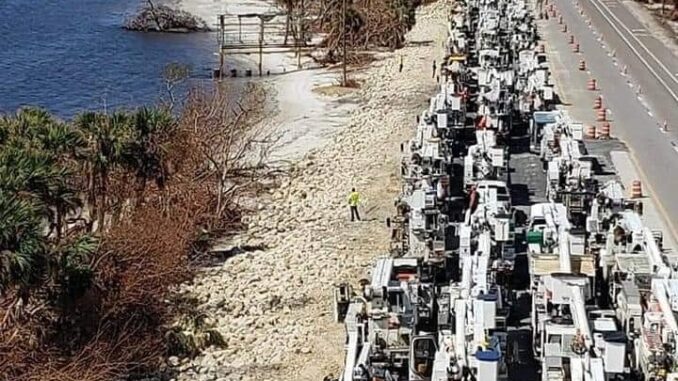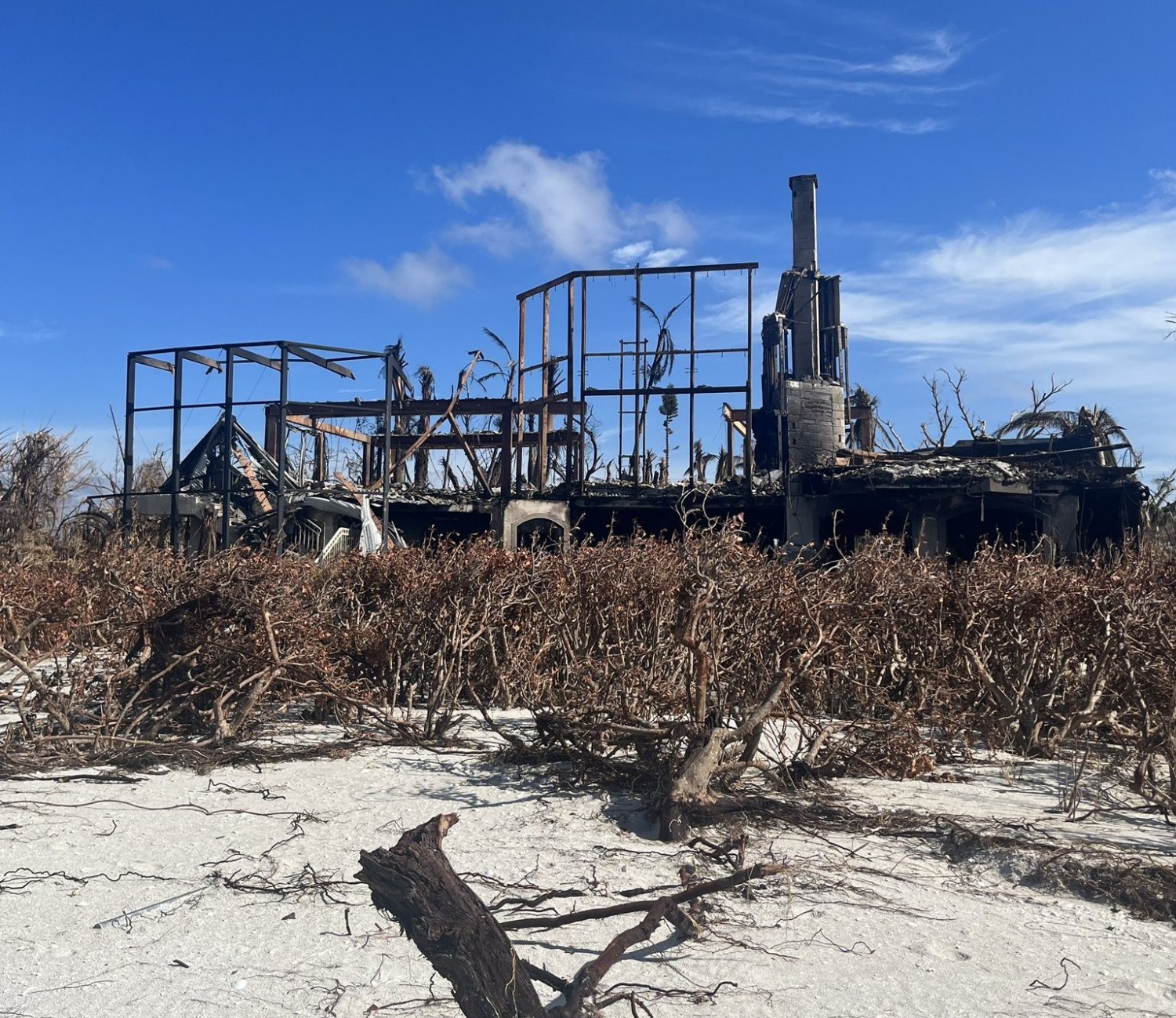
Without water and electricity for a week or more, residents in Southwest Florida felt like they were in a war zone. Despite waiting for hours for a fill-up or to obtain gas for generators, motorists were thankful they had an internal combustion engine vehicle because electric vehicle owners without power could not charge their vehicles at home and many charging stations, which did not have power either, were under water. But the most frightening aspect of electric vehicle ownership in the aftermath of Hurricane Ian was that water damage caused batteries to corrode and catch fire. The washed-up saltwater induces rapid corrosion, which can cause the lithium-ion battery in a flooded electric vehicle to malfunction and ultimately catch on fire. Test results show that salt bridges can form within the battery pack and provide a path for short circuit and self-heating, which can lead to fire ignition. And lithium batteries do not require oxygen to burn, as they are a chemical fire and therefore must be treated differently. As with other forms of battery degradation, the time period from self-heating to fire ignition can vary greatly.
This threat forced local fire departments to divert resources away from hurricane recovery to control and contain the fires. Car fires from electric vehicles last for a prolonged period, and in many cases, taking up to six hours to burn out. Even after the car fires are extinguished, they can reignite in an instant. Car fires can become life-threatening if water-damaged electric cars are parked near houses or in garages. Some Florida homes were lost to fires caused by flooded electric vehicles.

According to the Washington Times, even 1,500 gallons of water were not enough to fully extinguish a fire that was caused by the defective battery inside a Tesla Model X. Firefighters in Florida are receiving special training that teaches them how to quickly and safely extinguish a burning electric car. Florida currently ranks second in the nation for electric vehicles with 95,640 registrations as of December 31, 2021, second to California’s 563,070 registered electric vehicles.
This is a new concern for Biden’s Department of Transportation as President Biden wants 50 percent of new car sales to be all electric by 2030. Transportation Secretary Pete Buttigieg has been a strong proponent of electric vehicles, even suggesting that high gas prices were a good thing because people might be more likely to buy a battery-powered vehicle. Florida Senator Rick Scott wrote to the Secretary with his concerns about electric vehicle fires.
To reach the target set of 50 percent electric vehicles by 2030, the Biden administration is offering incentives for electric vehicles while investing heavily in its infrastructure. The Inflation Reduction Act continues the $7500 tax credit for new electric vehicle purchases and allows a smaller tax credit for used electric vehicles. However, the only electric vehicles eligible for the $7,500 tax credit in the climate/tax bill are ones made in North America using batteries with minerals obtained from U.S. mines or from its allies. While the United States has some of the needed minerals, regulatory roadblocks and lawsuits from environmentalists are in the way of developing those mining industries. A new mine in the United States can take seven to 10 years to complete all the permitting and paperwork before going online while in Canada and Australia, that process only takes two to three years. One mine in Minnesota (Twin Metals) has been waiting to get the go-ahead to mine since 1966.
California officially banned the sale of new gasoline-powered cars and trucks by 2035 with New York following in its footsteps. In both cases, the state rules would apply to all new cars, pickup trucks and SUVs. The regulations establish annual targets for the share of zero-emission vehicles automakers must sell in the state, starting at 35 percent in 2026, ramping up to 68 percent by 2030, and 100 percent by 2035. Some car makers, such as GM, have bought into the electric vehicle transition and are working toward an eventual phase-out of gas-powered vehicles, regardless of their safety and what the American public wants.
Electric vehicle prices average $66,000–far higher than conventional autos, keeping them out of reach for most consumers. Finding the lithium and other metals needed for their batteries is a costly challenge and puts China, who dominates the supply chain for electric vehicle batteries in the driver’s seat, making the United States dependent on a Communist country and our chief competitor for energy. The United States is almost four times more dependent upon China for the electric vehicle supply chain than it was dependent upon the Middle East for oil.
Conclusion
The Biden Administration is faced with a new challenge regarding electric vehicles. In the aftermath of Hurricane Ian, electric vehicle batteries flooded with salt water corroded and caught fire causing dangerous fires that are prolonged and, in some cases, igniting fires in houses that survived the destruction of the hurricane. This challenge adds to other challenges of electric vehicles, including their cost, the critical minerals needed to make them, our reliance on China for batteries and other components, the charging infrastructure needed, and the large demand that will be placed on the U.S. generating system, which in itself is expected to undergo a major transition to renewable energy that requires even more of these critical metals. The dream of some to force electric vehicles on the American public is meeting the realities of real-world life and so far, problems are abounding.
About The Crude Life
Award winning interviewer and broadcast journalist Jason Spiess and Content Correspondents engage with the industry’s best thinkers, writers, politicians, business leaders, scientists, entertainers, community leaders, cafe owners and other newsmakers in one-on-one interviews and round table discussions.
The Crude Life has been broadcasting on radio stations since 2012 and posts all updates and interviews on The Crude Life Social Media Network.
Everyday your story is being told by someone. Who is telling your story? Who are you telling your story to?
#thecrudelife promotes a culture of inclusion and respect through interviews, content creation, live events and partnerships that educate, enrich, and empower people to create a positive social environment for all, regardless of age, race, religion, sexual orientation, or physical or intellectual ability.
Sponsors, Music and Other Show Notes

Studio Sponsor: The Industrial Forest
The Industrial Forest is a network of environmentally minded and socially conscious businesses that are using industrial innovations to build a network of sustainable forests across the United States.
Weekly Sponsor: Stephen Heins, The Practical Environmentalist
Historically, Heins has been a writer on subjects ranging from broadband and the US electricity grid, to environmental, energy and regulatory topics.
Heins is also a vocal advocate of the Internet of Everything, free trade, and global issues affecting the third of our planet that still lives in abject poverty.
Heins is troubled by the Carbon Tax, Cap & Trade, Carbon Offsets and Carbon Credits, because he questions their efficacy in solving the climate problem, are too gamable by rent seekers, and are fraught with unreliable accounting.
Heins worries that climate and other environmental reporting in the US and Europe has become too politicized, ignores the essential role carbon-based energy continues to play in the lives of billions, demonizes the promise and practicality of Nuclear Energy and cheerleads for renewable energy sources that cannot solve the real world problems of scarcity and poverty.

Weekly Sponsor: Great American Mining Co
Great American Mining monetizes wasted, stranded and undervalued gas throughout the oil and gas industry by using it as a power generation source for bitcoin mining. We bring the market and our expertise to the molecule. Our solutions make producers more efficient and profitable while helping to reduce flaring and venting throughout the oil and gas value chain.

Join Podcasters from across the world and all walks of life as they unite to bring civil solutions to life and liberty.

Studio Email and Inbox Sponsor: To Be Announced

Featured Music: Alma Cook
For guest, band or show topic requests, email studio@thecrudelife.com
Spread the word. Support the industry. Share the energy.


